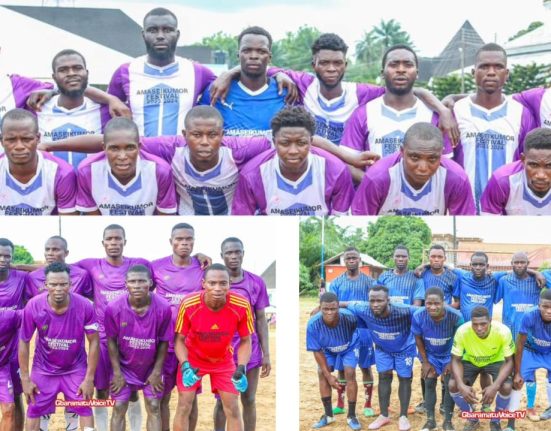Massive floods will sweep through many parts of the country between September and October, a Federal Government agency warned on Tuesday.
The Nigeria Hydrological Services Agency (NIHSA), which gave the red alert, advised residents of flood-prone areas to begin relocation because heavy rains will precipitate the flooding leading to destruction of property and likely loss of lives.
Director-General of the agency, Mr. Clement Nze, explained that 275 local government areas of the 774 will be moderately hit by the flood while 102 councils will be worse-hit.
Lagos, Rivers, Delta, Edo and Kogi are on top of the list of states to witness major flooding.
The others are Ogun, Ekiti, Kwara, Abia, Adamawa, Anambra, Bauchi, Bayelsa, Benue, Cross River, Ebonyi, Enugu, Gombe, Imo, Kaduna, Katsina, Kebbi, Nasarawa, Niger, Plateau, Sokoto, Yobe and Zamfara states.
All the local government areas in Lagos, except Epe and many parts of Ogun State, will be badly affected, the agency added.
NIHASA said governors of the states had been advised to begin immediate evacuation of residents in areas to be affected.
The NIHSA DG blamed the construction of houses on flood plains for the heavy flooding experienced in some parts of Abuja five days ago.
According to him, some lives and property were lost at ”the Sunday Adewusi Estate in the Dei Dei area of the Federal Capital Territory (FCT) because it was built on a flood plain.” The estate is owned by the police.
Nze said what was required before now across the country was proper drainage and demolition of structures on flood plains.
He said the flooding experienced so far in parts of the country was as a result of constant rainfall. He warned that the effect of any nation in the Niger Basin releasing water from its dam(s) might be too devastating for Nigeria, if nothing was done now.
He said: “The month of June is usually the period of effective rainfalls and the beginning of a new hydrological year in the River Niger Basin which covers nine countries of Benin, Burkina Faso, Cameroun, Chad, Cote D’ivoire, Guinea, Mali, Niger and Nigeria.
“Nigeria is downstream of all the countries in this basin. The months of July, August, September, and October are also known as JASO months signifying heavy rainfall, flooding, and flood disasters in most parts of the country.
The floods are often aggravated by the trans-boundary inflow of rivers Niger and Benue from outside the country before they empty into the Atlantic Ocean in Nigeria.
“As early as June, severe flooding incidents with attendant destructions and loss of lives were recorded in certain parts of the country.
This has continued unabated even when the country is still more than two months away from the peak of rains with the attendant flooding incidents associated with those months.
“NIHSA wishes to use this medium to advise state and local governments, stakeholders, multinational companies and public-spirited individuals and philanthropists that all hands should be on the deck to save the country from the consequences of flood pandemic in the year 2020.
“The country still has many days of rainfall in the course of the year. More floods are still expected in the months of August, September, and October.
In the event there is a release of excess water from the dams in other countries upstream rivers Niger and Benue, this will have more negative impact on Nigeria which is located downstream other countries in the Niger Basin.
“Therefore, blocked drainages and gutters should be cleared, river channels dredged and structures within the waterways and flood plains and flood paths pulled down.
“According to the 2020 Seasonal Rainfall Prediction (SRP) released earlier in the year by the Nigerian Meteorological Agency (NiMet), the earliest cessation date for rainfall in the southern part of the country is December 28th, while September 26th is the earliest cessation date for rainfall in the northern part of the country.”
Speaking on flooding in Lagos and Ogun states, Nze said: “On the average, Lagos and Ogun states are expected to have 255 days and 232 days of rainfall respectively in 2020.
While Lagos state suffers from a combination of coastal, urban and river flooding, Ogun state suffers from urban and river flooding.
“The picture presented above means that relevant agencies of the Lagos and Ogun states should brace for possible flooding incidents in the coming months. The country cannot afford to suffer another pandemic within a pandemic.”
Lagos State, early in the month, warned residents of four local government areas, especially those living on flood plains, to vacate their homes immediately. Those in 15 other councils also got the warning.
Environment and Water Resources Commissioner Tunji Bello listed the councils to be worst-hit as Lagos Mainland, Mushin, Ibeju-Lekki and Ikorodu.
Bello explained that the local governments were identified as “highly probable flood risk in 2020”.
In a statement, Mr. Bello said the four listed councils will witness high intensity rainfall between now and September.
He urged residents with structures in low land areas to relocate without delay to avoid any untoward incident that may come with flooding and loss of lives and properties.
Quoting from the Annual Flood Outlook released by the Hydrological Services Agency on May 28, Bello identified 15 other local government areas as those at flood risk this year.
The local government areas put on the red alert are: Lagos Island, Alimosho, Amuwo Odofin, Ikeja, Kosofe, Eti-Osa, Apapa, Ojo, Oshodi/Isolo, Agege, Ifako Ijaiye, Badagry, Surulere and Ajeromi-Ifelodun.
Bello assured that the ministry would intensify ongoing efforts at clearing silted drains as exemplified by the efforts of the Emergency Flood Abatement Gang (EFAG) all over the black spots in the state.
He advised residents to refrain from indiscriminate discharge of waste and to stop patronising itinerant cart pushers.
Support Quality Journalism in the Niger Delta Region
Join us in our mission to bring development journalism, cultural preservation, and environmental awareness to the forefront. Your contribution makes a difference in the lives of the people of the Niger Delta. Donate today and be a part of the change!









